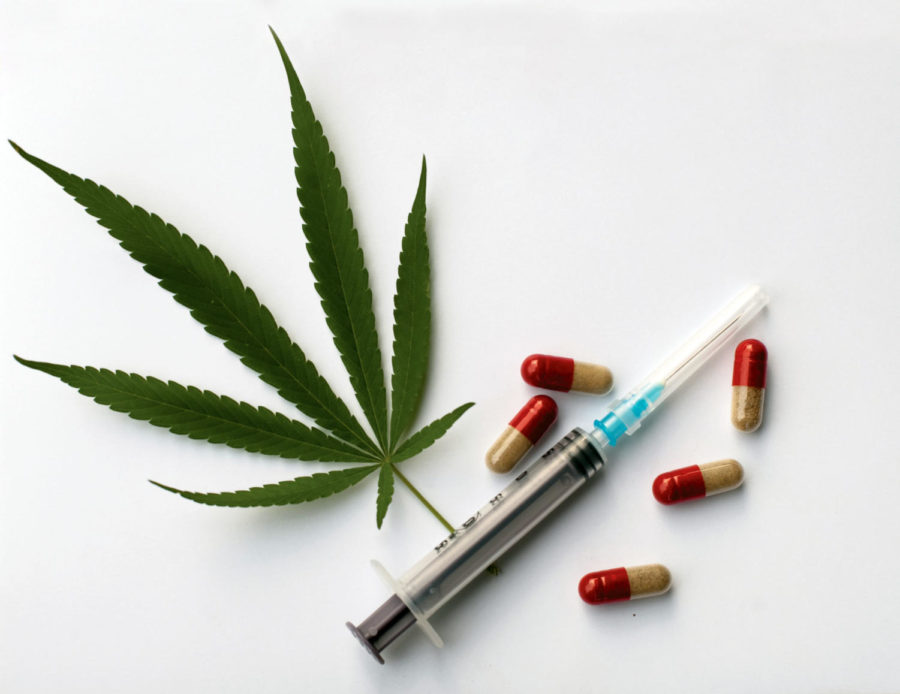Daily: Should drugs be legalized?
Opinion: Daily 11/29
November 29, 2012
Should all drugs be legalized? What about marijuana?
With the recent legalization of recreational use of marijuana in Colorado and Washington the larger issue of the legalization of all drugs in the United States has come into question. Supporters who voted to take measures to legalize marijuana in these states argue that legalization will generate tax revenue, decrease black market activity by moving trade into the public sphere, and alleviate the waste of tax resources being used by law enforcement. Furthermore, supporters, such as voters — typically younger and more liberal — who just voted in favor of legalizing weed in Washington and Colorado, say that current drug enforcement unfairly targets minorities and that current laws (those similar to Prohibition) will ultimately lead to greater crimes due to the demand for illegal drugs.
However, those that oppose the legalization of drugs say that criminalizing recreational drugs helps lower rates of use and abuse, which decreases related addictions and problems. These voters tend to be older and more conservative.
The question, then, is: Given this argument, would the United States be better off legalizing the use of all recreational drugs?
To explore the implications and issues surrounding the legalization of drugs a debate on the motion “Legalize Drugs” was held by a panel of experts on Intelligence Squared U.S. Profiles of the panel experts can be found in the article “Should We Legalize Drugs?” written by NPR staff. Those arguing for the motion included Paul Butler, criminal law scholar and professor at Georgetown University Law Center, and Nick Gillespie, editor-in-chief of the online and television platforms for the libertarian magazine Reason. Those arguing against the motion included the former chief of the Drug Enforcement Administration, Asa Hutchinson, and Theodore Dalrymple, retired prison doctor and psychiatrist.
To frame the debate the founder of Intelligence Squared U.S., Robert Rosenkranz, explained that those in favor of legalization have a strong argument because the current policy and “War on Drugs” has failed. When explaining the supporters’ opinion Rosenkranz said, “We’d be better off placing reliance on treatment, on rehabilitation, on education. … The costs of creating a criminal industry are huge; not only the obvious costs of enforcement, of prison, but we create a situation in which the leading role models in inner city communities are drug dealers in which a disproportionate number of black youth languish away in prisons.”
He went on explain the opposition’s argument which is that the choice of using recreational drugs cannot be left up to the individual because the consequences of drug use are too great, and the individual can have a huge impact on society, so the choice should be regulated by the government.
Ultimately, the winners of the debate were Butler and Gillespie, supporters of the motion, with a victory of 58 to 30 percent. (The remainder was undecided.) Personally, I would agree with the supporters of the motion given the argument. However, both sides raised several important concerns.
One of the main tenets of the debate was the racial issues and prejudices in drug enforcement. Butler, a former prosecutor, told his personal testimony of his experience with drug enforcement in the community. He said, “Maybe my work as a prosecutor would’ve been worth the enormous social cost if it was getting drugs off the street, but we all know the war on drugs doesn’t do that. No country has ever found a way to prevent people from using drugs. The United States locks up more people than any country in the history of the world.”
“We have 5 percent of the world’s population and 25 percent of the world’s prisoners. It costs us billions of dollars that we just cannot afford, and it’s just as easy to get drugs now as it always has been.” Butler went on to discuss the disparity between black and white incarceration rates, which are unfairly higher for blacks. Of course, not all of these incarcerations are drug related, but approximately one-quarter of criminals in U.S. jails or prisons have been convicted of a drug offense (Prisons & Drug Offenders).
In addition to this, the legalization of marijuana was widely debated. Interestingly, the opposition argued that if marijuana is legalized across all 50 states, all other drugs would have to be legalized. Asa Hutchinson, who is opposed to legalizing drugs, said, “This debate is not about marijuana. It is drugs, plural. And to be consistent in your philosophy of libertarianism, which my colleagues are consistent, they recognize it doesn’t do any good to legalize one. You have to legalize all… because that’s the only way you’re going to change the environment of enforcement, to change the environment of police and so on. And so the debate tonight is about legalizing all drugs.”
Of course, this was the issue being debated — the legalization of all drugs — but why not start with legalizing marijuana in the states and see what the effects are before legalizing all other recreational drugs? Traditionally the states have been testing ground for policies before they are enacted at a federal level, and Colorado and Washington have set a precedent for this motion.
Gillespie made a seemingly valid argument when he compared the use of marijuana to alcohol consumption: “So when we are talking about what drug legalization would look like, first off, it’s all marijuana use. Vanishingly small percentage of people use drugs other than marijuana. But let me just say… There’s not a single dimension across which pot is more dangerous than alcohol, which is pretty much all you need to know about a postprohibition American society.”
After hearing the arguments and considering the implications of the motion, is the legalization of marijuana okay? Should all recreational drugs be legalized? Is this “war” worth fighting, or are we merely facing a social reality that should be legally accepted?

















